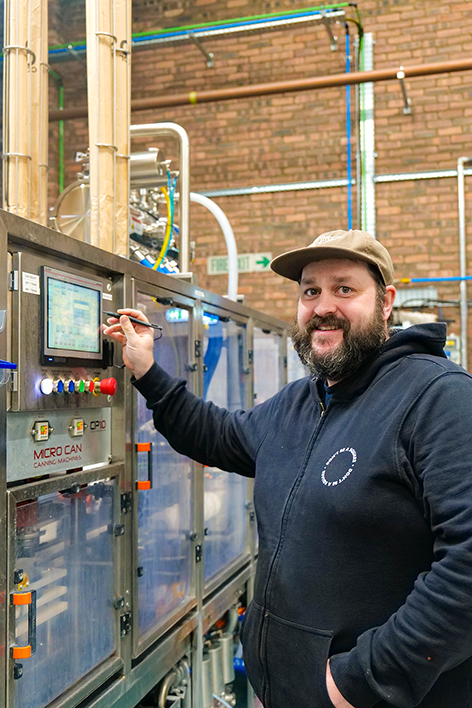In today’s blog, we’re diving into the anatomy of our brewery- exploring each piece of equipment, what it does, and why it’s essential to the beer-making progress. From the mill all the way to the canning line, we’ll simply break down the role each component plays in transforming simple ingredients into the craft beer you love.
Table of Content
The Mill
Milling is one of the first steps in the brewing process. In a brewery, the mill is a machine used to crush grains such as malted barley into a fine form called ‘Grist’. Milling essentially exposes the starchy interior of these grain kernels allowing the starches, sugars and enzymes inside to be extracted and used in the beer eventually produced.
This crushing process within the mill is very important, without it you’re going to find it difficult to make a beer!

Here at Full Circle brewery, we use Simpsons Malt based in Berwick-Upon-Tweed. Their malt offers versatility and fantastic taste and mouth feel.

Mash Tun
The next step in the brewing process is the mash tun. Basically, a mash tun acts as a large cooking pot, designed to stew the grist that has been created in the mill using hot water, creating a sweet liquid known as ‘wort’. This is then drained from the mash tun and used in the fermentation process.

Lauter Tun
A lauter tun works like a large sieve. When the mash is transferred from the mash tun,some particules of grain remain in suspension. These particles are then sent back into the grain bed so they never enter the wort stream.
This is when a process called vorlauf takes place. Vorlauf, meaning recirculation in German, is a process in which the wort is drained by gravity into a collection vessel called a grant from which it is pumped over the top of the grain bed.
The grain bed then traps all of the particulate matter. The brewers continue this process until the liquid tuns clear before it is then transported into the kettle.

Brew Kettle
A brew kettle, also known as a brewing kettle, is a large pot used in beer making to boil the wort. This is also the point in which hops are added to the beer.
Hops are added at the start of the boil to extract bitterness from the alpha acids, in the mid-boil to enhance hop character and create a fuller hop presence and finally near the end of the boil helps to infuse more flavour and aroma.
Boiling the wort with hops releases their essential oils and other compounds, which contribute to the beer's flavour and aroma. As well as this, the boiling helps eradicate any unwanted microorganisms found within the wort.

Whirl Pool
Whirl-pooling is a common method used in brewing, and a process we use at Full Circle brewery to preserve aromas within the liquid wort created by the hops added whilst boiling.
It involves creating a swirling motion in the wort, causing solids to settle at the center, which can then be drained or filtered off, resulting in clearer wort and the presveration of aroma created by the hops added during the boil.
Whirlpooling also has benefits including reducing bitterness, faster chilling and minimised DMS (dimethyl sulfide).

Fermentation Tanks
At their core, fermentation tanks are containers designed to support the fermentation process of beer. They provide an optimised environment for microorganisms to thrive.
The process of fermentation is essential for developing the beer’s alcohol content, flavour and aroma. It also controls production, ensuring consistent flavour and texture.

Conditioning Tanks
Conditioning tanks, are tailored vessels used in brewing to prepare and refine beer for it’s final stage. They play a crucial role in clarifying beer, controlling carbnation and ensures the beer is ready for packaging and distribution.

The Canning Line
A canning line is a convyeyer belt system of machines that processes and packages canned beverages. It involves feeding empty cans, rinsing, filling, sealing, inspection, and finally, packaging the cans.
The canning line timeline:
- Feeding: Empty cans are fed into the conveyor belt system.
- Rinsing: The cans are rinsed to remove any spoilage.
- Filling: The cans are filled with beer, often using counter-pressure filling to maintain carbonation and minimize oxygen exposure.
- Sealing: Lids are securely attached to the cans, creating a hermetic seal to prevent leakage and spoilage.
- Labelling: Labels are applied to the cans.
- Packaging: The canned beer is packaged for distribution.




Our Taproom

Located in Hoult's Yard, Newcastle. Full Circle Brew Co and Tap Room is within easy reach of the city centre, in the craft beer haven of the Byker and Ouseburn communities. The taproom offers 13 beers on draught and wood-fired pizza wednesday through to Sunday. Immerse yourself in the brewery environment as you sit back and enjoy the glass-fronted taproom overlooking the entire brewery.
Full Circle Brewery Tour
With your brewery ticke, you can experience the inner workings of our brewery in-person. We'll take you through our brewery, show you equipment that makes it happen as shown above, but in more depth.
The tour ticket also includes:
Live Q&A
1/3 of a pint of 3 of our beers that have been brewed only recently by our brewing team.


Frequently Asked Questions
Where is Full Circle brewery located?
Hoults Yard, Byker, Newcastle upon Tyne NE6 2HL
How do I book a brewery tour?
You can book a brewery tour on our website! Simply choose a time and date slot suitable for you.
How long does a brewery tour at Full Circle usually last?
Roughly 40 minutes to an hour.
What beers are sold on draught in Full Circle taproom?
We have a selection of 15 beers on draught in our taproom. These beer include our core range, the two currently seasonal beers of that month, previous seasonals as well as Hogan's cider. We often switch a couple of our seasonal for some guest beers!

